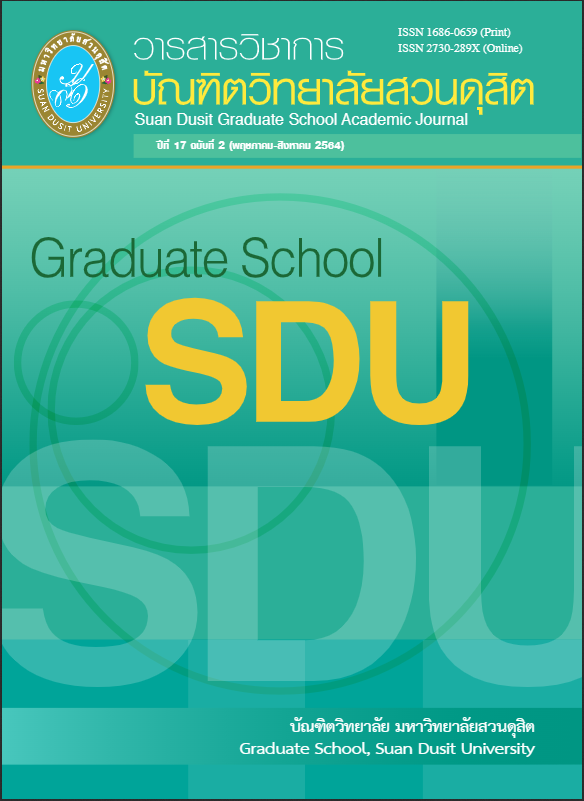The Marketing Mix 4.0 from the Stakeholders' Perspective towards the Image and Reputation of Hua Hin Tourism Brand, Prachuap Khiri Khan
Keywords:
Marketing Mix 4.0, Tourism Brand, Tourism Image, Hua HinAbstract
This qualitative research was aimed to study the marketing mix 4.0 from the stakeholders' perspective towards the image and reputation of Hua Hin tourism brand, Prachuap Khiri Khan. The qualitative research through semi-structured interviews was conducted to collect data. The purposive sampling was used to select 20 key informants from governmental departments, entrepreneurs, community, and academic representatives. The triangulation was applied as the data verification method. The data analysis method was content analysis with an emphasis on prioritizing and categorizing, including systematic analyzing and summarizing. The results showed that 1) co-creation, the mutual information between the destination and tourists had the potential for developing effective tourism products and services, and was the performance indicator of tourists' tastes and needs 2) currency, the price adjustments and payment methods were related to market mechanisms and tourism seasons. The fair price guarantee by trustworthy agencies enabled tourists to compare prices which supported tourists' purchasing decisions based on quality and satisfaction 3) communal activation, the cooperation of the business sector facilitated the process of tourists' purchasing decision of tourism services more active and more satisfying. Moreover, the small-size businesses in the communities should be trained on the competition of the online marketing channels. 4) conversation, social media should monitor tourists' engagement and provide the platforms for tourists to express opinions and exchange information and experience. Therefore, the results should be beneficial to the policy guidelines of Hua Hin tourism development.
References
คณะกรรมการสนับสนุนการจัดทำแผนพัฒนาเทศบาลเมืองหัวหิน. (2560). แผนพัฒนาสามปี (พ.ศ. 2560-2562). ประจวบคีรีขันธ์: เทศบาลเมืองหัวหิน.
ชฎาภาตงสาลี. (2557). การรับรู้ภาพลักษณ์ของอำเภอหัวหิน จังหวัดประจวบคีรีขันธ์ Veridian E-Journal, Silpakorn University, 7 (3): 1257-1264.
เสรี วงษ์มณฑา, และ ชุษณะ เตชคณา. (2560). การตลาด 4.0 ในบริบทประเทศไทย 4.0. วารสารเศรษฐศาสตร์ และนโยบายสาธารณะ, 8 (15): 1-16.
วรรณดี สุทธินรากร. (2561). การวิเคราะห์ข้อมูลในงานวิจัยเชิงคุณภาพ (Data Analysis of the Qualitative Research) (พิมพ์ครั้งที่ 1) กรุงเทพฯ: สยามปริทัศน์.
วรรณี งามขจรกุลกิจ. (2559). การเข้าใจและเข้าถึงผู้บริโภคยุค 4.0 เพื่อความสำเร็จของแบรนด์. การประชุม วิชาการระดับชาติและนานาชาติมหาวิทยาลัยศรีปทุม. 11, กรุงเทพฯ: มหาวิทยาลัยศรีปทุม. 1251-1256.
สุภางค์ จันทวานิช. (2553). วิธีการวิจัยเชิงคุณภาพ (พิมพ์ครั้งที่ 18). กรุงเทพฯ: จุฬาลงกรณ์มหาวิทยาลัย.
da Silva Oliveira, E. (2013). Making Strategies in Destination Branding. [Online] Available: https://www.rug.nl/research/portal/files/15687548/Oliveira_2013_Making_Strategies_in_Destination_Branding.pat20131112_6042_1b5cyvi_libre_libre.pdf [2019, February 13]
Giannopoulos, A. A., Piha, L. P., & Avlonitis, G. J. (2011). "Desti-Nation Branding": what for? From the Notions of Tourism and Nation Branding to An Integrated Framework. [Online] Available: http://www.culturaldiplomacy.org/culturaldiplomacynews/content/articles/participantpapers/2011/april/biec-roa-nua/desti-nation_branding-_antonios_giannopoulos.pdf [2019, March 11]
Kasapi, I., & Cela, A. (2017, July). Destination Branding: A Review of the City Branding Literature. Mediterranean Journal of Social Sciences, 8(4), 129-142. doi:10.1515/mjss-2017-0012
Kotler, P., Kartajaya, H., & Setiawan, I. (2017). Marketing 4.0: Moving from Traditional to Digital. New Jersey: John Wiley & Sons, Inc.
McMillan, J. H., & Schumacher, S. (1997). Research in Education: A Conceptual Introduction. New York: Longman.
Downloads
Published
How to Cite
Issue
Section
License
Copyright (c) 2021 Suan Dusit Graduate School Acadamic Journal

This work is licensed under a Creative Commons Attribution-NonCommercial-NoDerivatives 4.0 International License.






